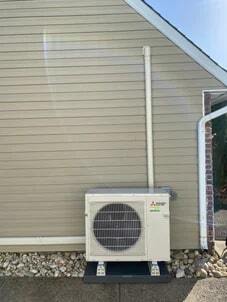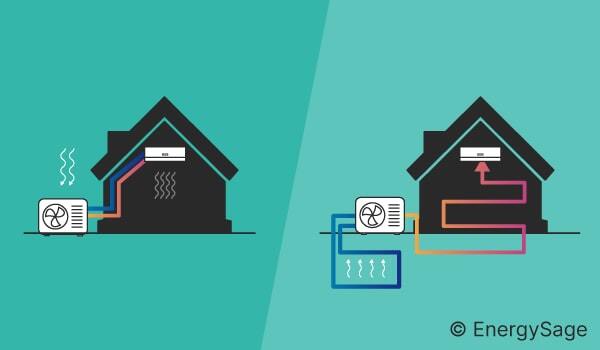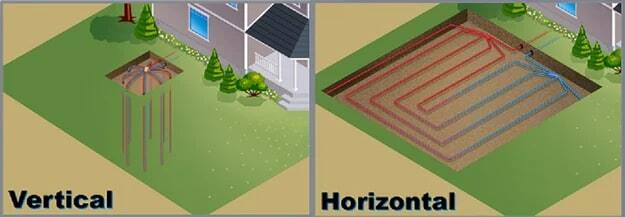Discover the differences between ground source and air source heat pumps to choose the right option for your heating and cooling needs. Ground source heat pumps extract heat from the ground and have a slight efficiency advantage due to stable ground temperature, but require a ground loop system. Air source heat pumps draw heat from the outside air and are generally more affordable to install, but may be less efficient in extremely cold climates. Consider factors like efficiency, installation requirements, and cost savings when making your decision.
What are Heat Pumps?
Heat pumps are highly efficient heating and cooling systems that use electricity to transfer heat from one area to another. Unlike traditional heating systems that generate heat, heat pumps simply move heat from one place to another. They work by extracting heat from a source and transferring it to a different location, either for heating or cooling purposes.
Air source heat pumps draw heat from the ambient air, while ground source heat pumps extract heat from the ground. Both types of heat pumps operate on the same basic principle, but their heat sources differ.
Where Does the Heat Come From?
Air source heat pumps (left) extract heat from the outside air, even in cold weather. They utilize a refrigerant that absorbs heat from the outdoor air and transfers it indoors to provide heating.
Ground source heat pumps (right), on the other hand, extract heat from the ground through a series of pipes buried underground. The ground temperature remains relatively constant throughout the year, allowing ground source heat pumps to efficiently extract heat, regardless of the outside temperature.

The Efficiency Advantage
Heat pumps are known for their high efficiency, as they can provide more energy for heating or cooling compared to the electricity they consume. The efficiency of a heat pump is measured by its Coefficient of Performance (COP), which represents the ratio of heat output to electricity input. Both ground source and air source heat pumps offer excellent efficiency, but ground source heat pumps tend to have a slight advantage.
Ground source heat pumps benefit from the stable ground temperature, which allows them to operate at a higher COP throughout the year. Air source heat pumps, on the other hand, may experience reduced efficiency in extremely cold climates when the outdoor air temperature drops significantly.
However, it's important to consider factors such as insulation, climate, and the specific heating and cooling needs of your home or building when determining which type of heat pump is more efficient for your situation.
Installation Differences
The installation process for ground source heat pumps and air source heat pumps differs due to the nature of their heat sources.
Ground source heat pumps require the installation of a ground loop system, which consists of pipes buried underground. These pipes circulate a heat transfer fluid that absorbs heat from the ground and carries it to the heat pump. The ground loop system can be installed horizontally if sufficient land area is available, or vertically through boreholes if space is limited.
In contrast, air source heat pumps do not require a ground loop system. They are typically installed outside the building, either on the ground or mounted on a wall. The installation process is generally simpler and less invasive compared to ground source heat pumps.
It's important to note that the installation of ground source heat pumps may require more upfront investment and expertise due to the complexity of the ground loop system.

Ground loop system: Horizontal and vertical
Cost Considerations
When comparing the cost of ground source heat pumps and air source heat pumps, several factors should be taken into account.
Ground source heat pumps tend to have higher upfront installation costs compared to air source heat pumps. This is primarily due to the expenses associated with the excavation and installation of the ground loop system. However, ground source heat pumps can provide long-term energy savings, potentially offsetting the initial investment over time.
Air source heat pumps are generally more affordable to install since they do not require the installation of a ground loop system. However, their efficiency may be slightly lower in extremely cold climates, which could lead to higher energy consumption and operating costs.
It's important to consider your budget, energy consumption patterns, and long-term savings potential when evaluating the cost differences between ground source and air source heat pumps.
Conclusion
In conclusion, when choosing between ground source and air source heat pumps, it's essential to consider factors such as efficiency, installation requirements, and cost savings. By evaluating these factors, you can make an informed decision and choose the right heat pump option for your heating and cooling needs.
If you live in the Delaware Valley/Greater Philadelphia area and would like to find comfort within your home, visit our website or give us a call at 215 - 245 - 3200 to learn more.




